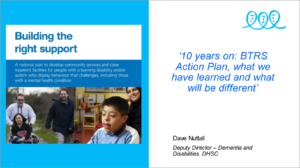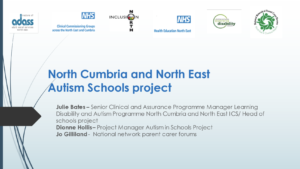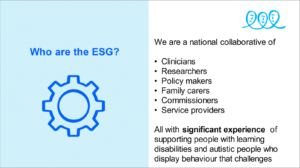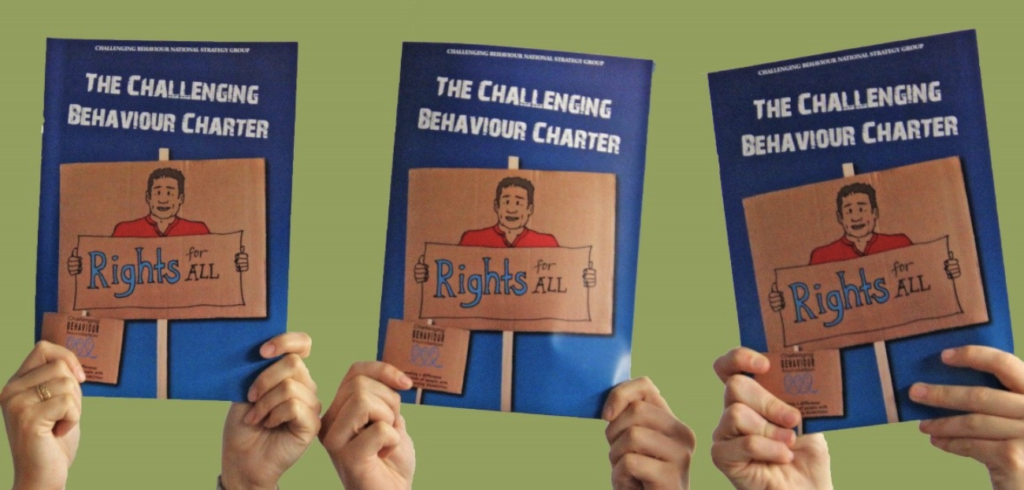Using best practice to influence and drive change: improving practice in local and national delivery of health and social care for children and adults with learning disabilities.
The Challenging Behaviour National Strategy Group meeting, ‘Improving practice in the local and national delivery of health and social care for people with learning disabilities by using best practice to influence and drive change’, was held virtually on the 22nd of November 2021. The event focused on how to promote the needs and interests of children and adults with learning disabilities whose behaviour is described as challenging, and their families, within a changing health and social care landscape, and how new developments in best practice could be rolled out nationally to advance these interests.
The meeting coincided with government plans to reform the delivery of health and social care in the UK, and the development of a new Building the Right Support (BTRS) action plan. Consequently, during the morning session attendees considered how changes in health and social care structures would impact children, young people and adults with learning disabilities, and their families, and how the needs and rights of people with learning disabilities could be championed and protected within the new Integrated Care Systems. CB-NSG attendees also discussed whether the proposed draft BTRS “action plan” would deliver the promises made by the government a decade ago after the abuse exposed at Winterbourne view hospital: to close inadequate services; discharge anyone with learning disabilities inappropriately admitted to hospital; and improve the provision of community care so that people could live fulfilled lives in their local communities.
During the afternoon session, five workshops on new developments in best practice were held. Attendees discussed the research and examples of best practice, why such practices worked so well, and what actions could be taken to encourage national implementation of each practice. This was the third virtual CB-NSG to have taken place and the meeting involved a combination of presentations, breakout group discussions and feedback. In each breakout group, participants agreed key actions to take forward.
Outcomes
The planned outcomes for the meeting were:
- To listen to the voices of people with learning disabilities and their families and use this to influence and drive change in practice.
- To understand and comment on the proposals in the new Building the Right Support (BTRS) Action plan, and key planned changes in the delivery of health and social care (Integrated Care Systems (ICS) and Provider Collaboratives).
- To discuss whether and how the BTRS action plan and ICS might address the issues recommended in recent reports to ensure the effective provision of care and support for children and adults with learning disabilities.
- To identify the key components of best practice and the actions required to replicate and share them to improve the quality of health and social care for children and adults with learning disabilities whose behaviour challenges.
- To agree individual and collective actions to overcome regional variations in support and services and identify ways to improve national implementation of existing best practice.
Morning presentations and discussions:
Influencing Changes in the Delivery of Health and Social Care
The morning session of the CB-NSG comprised of three presentations, which began with a family carer who described her son’s needs, support and services and what needed to be in place for him to have a good life. The issues she identified were referred to throughout all of the following discussions. Following presentations about the new draft Building The Right Support action plan, and Integrated Care Systems, attendees were split into breakout groups to discuss the content and produce feedback and actions to ensure promotion of the interests and rights of children and adults with learning disabilities.
A document summarising recent reports and recommendations was created for the CB-NSG in November, to influence discussion and remind attendees of areas in which progress must be made to improve the quality of life of children, young people and adults whose behaviour challenges.
Click here to see the CB-NSG Reports and recommendations summary document
Family carer presentation
(Further details of the presentation to be added early 2022)
The next two presentations in the morning session were each followed by breakout group discussions of the issues covered, questions to be answered and actions to take forward.
Dave Nuttall (Department for Health and Social Care): ‘10 years on: Building The Right Support Action Plan, What we have Learnt and What will be Different’

Dave Nuttall (Deputy Director for Dementia and Disabilities) gave CB-NSG attendees a summary of what is to be included in the new Building the Right Support (BTRS) action plan, and how this plan intended to build upon learning from previous government strategies. The plan is split into four areas of action: improving community support; preventing crisis and avoidable admission; timely and effective discharge; and quality of care. The plan will also ‘set out clear milestones, timescales and measures of success for all commitments’. Currently, the BTRS action plan is undergoing limited consultation, led by the Department for Health and Social Care, to check if it effectively addresses the needs and interests of children, young people and adults with learning disabilities, and their families and will drive the change required.
After the presentation, attendees were split into five breakout groups to discuss the BTRS action plan in relation to the following areas:
- Accountability, measuring progress and oversight
- Funding
- Timely and effective discharges
- Workforce skills and capacity
- Trauma support
Click here to see the CB-NSG’s ‘Building the Right Support’ feedback submitted to the DHSC
Ashok Roy: ‘Changes in the Delivery of Health and Care – Integrated Care Systems and Provider Collaboratives’
 The Health and Social Care Bill (2021) currently being debated in the House of Lords sets out the government’s new health and social structures to be implemented in April 2022 which are called Integrated Care Systems (ICS). Ashok Roy, co-chair of the Learning Disability Senate, presented an overview of the new ICS, their key functions and the bodies which are make-up ICS, such as Provider Collaboratives. ICS combine all health and social care services for a given geographical area into one group, involving multiple CCGs, local authorities, NHS trusts and health and social care providers. Ashok highlighted aspects of ICS we are still to learn about and answered questions from CB-NSG attendees on the new structures.
The Health and Social Care Bill (2021) currently being debated in the House of Lords sets out the government’s new health and social structures to be implemented in April 2022 which are called Integrated Care Systems (ICS). Ashok Roy, co-chair of the Learning Disability Senate, presented an overview of the new ICS, their key functions and the bodies which are make-up ICS, such as Provider Collaboratives. ICS combine all health and social care services for a given geographical area into one group, involving multiple CCGs, local authorities, NHS trusts and health and social care providers. Ashok highlighted aspects of ICS we are still to learn about and answered questions from CB-NSG attendees on the new structures.
During the subsequent breakout group discussions, attendees focused on:
- What we know and what we don’t
- Key concerns regarding the new structures
- How we ensure that Transforming Care, and recommendations from recent reports and reviews, will be implemented within the new structures
Click here to see a summary document on Integrated Care Systems
Click here to see the CB-NSG’s discussion and actions from the ICS breakout rooms
Afternoon workshops:
Considering the components of best practice to improve the quality of health and social care
After a lunch break during which attendees were given the opportunity to network virtually by joining different breakout rooms, the afternoon session of best practice workshops began. Attendees were allocated to one of five workshops, each involving a presentation on a new development in best practice for children, adults or both with learning disabilities and/or autistic people whose behaviour challenges, and discussion of why this practice works so well and how it could be implemented nationally. After the workshops, feedback on the areas of best practice and actions to progress their national implementation was given by each group to all CB-NSG attendees.
Workshop 1: How can community intellectual disabilities services improve the delivery of psychological therapies for aggressive challenging behaviour?
Professor Angela Hassiotis, Dr Rachel Royston
Professor Angela Hassiotis’ workshop explored attendees’ views on how services can better deliver and implement psychological therapies to adults with learning disabilities who display aggressive challenging behaviour. Angela, along with Dr Rachel Royston and a research team have been funded to co-develop and test a personalised approach to support individuals who display for aggressive challenging behaviour. During the workshop, preliminary findings were presented to generate discussion around the therapy delivery. Key areas discussed were the different barriers to, and facilitators of, therapy delivery, and the clinical pathway required for this form of intervention.
Click here for the writeup and actions from Workshop 1
Workshop 2: AID-ITT: Supporting young people with a diagnosis of Autism or Learning Disability who are at risk of a CAMHS inpatient admission
Dr Catherine Sholl, Maisie Krisson
AID-ITT is a national and Specialist CAMHS Autism and Intellectual Disabilities Intensive Intervention Team (AID-IIT) developed by Dr Catherine Sholl and her team. It is a new service funded by NHS England covering the London region. The aim of the service is to support young people, families and local services to reduce unnecessary CAMHS inpatient admissions for young people with Learning Disability or Autism, and to support successful and timely discharges to the community for those who have already been admitted to inpatient units. The AID-IIT and workshop both addressed the context of a lack of progress being made under the Transforming Care agenda for children and young people with learning disabilities or autism. The aim of Dr Sholl’s workshop was to receive the CB-NSG’s feedback, ideas and opinions to support the development of the AID-IIT service.
An additional workshop aim was to gather attendees’ own personal and professional experiences of children and young people with learning disabilities or autism in CAMHS inpatient units (or at risk of a CAMHS inpatient admission), and what helped in their situation or what could have been done differently to support the child/young person.
Click here for the writeup and actions from Workshop 2
Workshop 3: The development of an Integrated Intensive Support Service
Phil Boulter, Dr Karen Dodd, Selven Daniel
Through their workshop, Phil Boulter, Dr Karen Dodd and Selven Daniel aimed to demonstrate the effectiveness of an integrated intensive support service in preventing placement breakdown and hospital admissions and consider how it can be replicated elsewhere. The presenter’s Integrated Intensive Support Service was formed in late 2016 in line with guidance from NHS England and Transforming Care principles. The workshop demonstrated how systems can work together to prevent placement breakdown and admissions, explored why this service works and ongoing challenges, and considered how to replicate the service nationally.
Click here for the writeup and actions from Workshop 3
Workshop 4: Transforming Care and the NHSE Schools Autism Project
Sarah Broadhurst, Julie Bates, Dionne Hollis, Joanne Gilliland
 The NHSE Autism School Project hoped to – by enabling children and young people to be supported well in the school environment – prevent unnecessary admissions to hospital in the long term. The project was built on the North Cumbria and North-East Accelerator Schools Autism Project, with the hope that additional NHSE regions could have project sites rolling out the core aspects of the project. The workshop focused on several key areas, such as: how mainstream education could meet the needs of autistic children and young people (and the challenges to this); the interface between schools and child and adolescent mental health services (and developing a ‘fit for purpose’ model); Parent carer forums, connecting parents in mainstream schools, co-producing training and building networks of support; and strategies and actions for maximizing impact of the project.
The NHSE Autism School Project hoped to – by enabling children and young people to be supported well in the school environment – prevent unnecessary admissions to hospital in the long term. The project was built on the North Cumbria and North-East Accelerator Schools Autism Project, with the hope that additional NHSE regions could have project sites rolling out the core aspects of the project. The workshop focused on several key areas, such as: how mainstream education could meet the needs of autistic children and young people (and the challenges to this); the interface between schools and child and adolescent mental health services (and developing a ‘fit for purpose’ model); Parent carer forums, connecting parents in mainstream schools, co-producing training and building networks of support; and strategies and actions for maximizing impact of the project.
Click here for the writeup and actions from Workshop 4
Workshop 5: External support group: Working with clinical teams to support individuals in a local area
Dr Theresa Joyce, Vivien Cooper
 The final workshop offered to a group of attendees was about the External Support Group (ESG), an initiative set up by the CBF that brings together a number of individuals with significant practical experience in supporting individuals with complex needs in community settings. The workshop was run by two ESG members, Dr Theresa Joyce and CBF CEO, Vivien Cooper. The ESG focuses on connecting up people with particular skills and expertise and on practical doing with, not doing for, local teams and professionals working with people with a learning disability. Members of the ESG have wide-ranging experience of developing individualised packages of support, and how the support should be maintained to provide good outcomes for individuals which can be drawn on as required. The aims of the workshop were to provide information on how the ESG is trying to inspire best practice, and to collate feedback on how the ESG could be improved or further developed.
The final workshop offered to a group of attendees was about the External Support Group (ESG), an initiative set up by the CBF that brings together a number of individuals with significant practical experience in supporting individuals with complex needs in community settings. The workshop was run by two ESG members, Dr Theresa Joyce and CBF CEO, Vivien Cooper. The ESG focuses on connecting up people with particular skills and expertise and on practical doing with, not doing for, local teams and professionals working with people with a learning disability. Members of the ESG have wide-ranging experience of developing individualised packages of support, and how the support should be maintained to provide good outcomes for individuals which can be drawn on as required. The aims of the workshop were to provide information on how the ESG is trying to inspire best practice, and to collate feedback on how the ESG could be improved or further developed.
Click here for the writeup and actions from Workshop 5
Feedback:
After the afternoon workshops, attendees returned to the main meeting to feedback their key messages to everyone.
Overall, the day was received positively by attendees and was rated overwhelmingly as ‘useful’ or ‘very useful’ by attendees.
Click here for a summary of the CB-NSG Evaluation
Many thanks to all who presented or facilitated workshop discussions, and especially to everyone who agreed to take action following the meeting.


